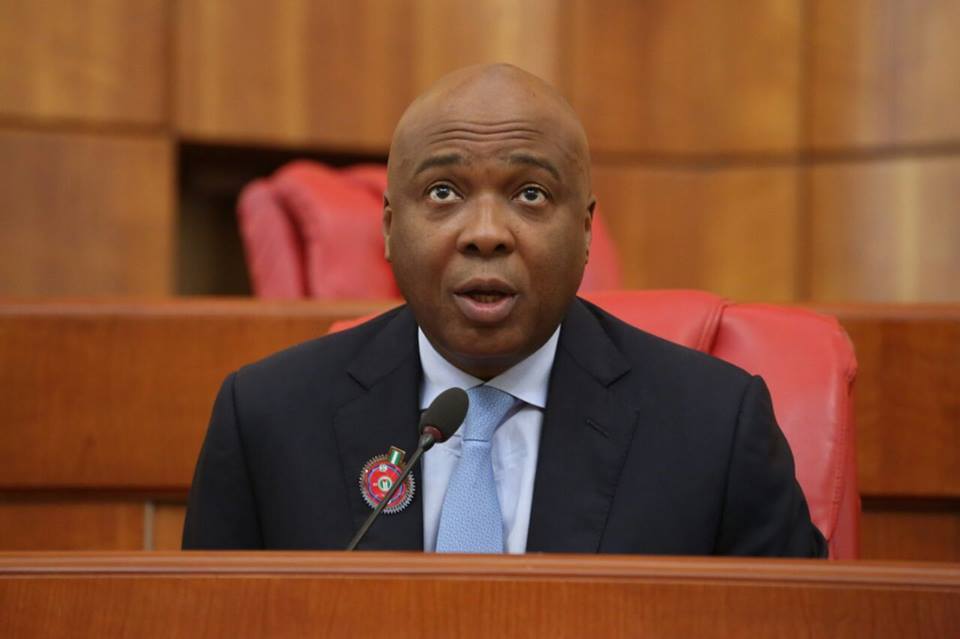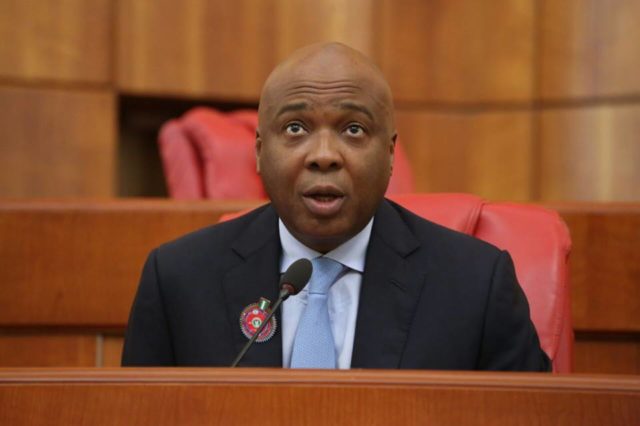 While his emergence as senate president proved a mastery of political manoeuvrings and cunningness, his manner of control of Nigeria’s upper legislative chamber appears clearly Machiavellian, one that broods no opposition.
While his emergence as senate president proved a mastery of political manoeuvrings and cunningness, his manner of control of Nigeria’s upper legislative chamber appears clearly Machiavellian, one that broods no opposition.
As Nigeria’s Senate President, Bukola Saraki has ensured that neither his ruling party, the All Progressives Congress, nor President Muhammadu Buhari, can have any substantial slice as far as the control of the upper legislative chamber is concerned..
At least three senators who dared to oppose Mr. Saraki have learnt the hard way that no one challenges the king, a stern warning to others who might want to dare the politician, whose father was also a leader of that chamber in the Second Republic.
However, to understand how the Kwara-born politician achieved this feat, one needs to understand how he emerged Senate President.
SARAKI’S EMERGENCE
The politics that played out in the emergence of the former Kwara State governor was ample signal to what the chamber would experience under his leadership. The APC had emerged the ruling party, winning not only the presidential election, but also majority in both chambers of the National Assembly. The party, therefore, thought it best to decide who to anoint as Senate President and Speaker of the House of Representatives. A straw poll was held with Ahmed Lawan from Borno defeating Mr. Saraki. The APC thus adopted Mr. Lawan as its candidate for the position of senate president.
Mr. Saraki would, however, have none of it. Rather than lose a seat he has coveted for so long and worked so hard to clinch, he would rather dine with the ‘enemy.’ He thus secured a clandestine agreement with members of the opposition PDP to secure their support while ensuring that a PDP member, Ike Ekweremadu, emerges his deputy.
Thus, on the day the formal election for senate president was to be held, while majority of APC senators, about 50, were waiting for President Muhammadu Buhari who had invited them to a meeting with him at the International Conference Centre, Mr. Saraki and other “rebel” senators of the APC moved into the National Assembly complex, where the police had thrown a cordon to prevent workers and reporters from entering, for the “election” of principal officers.
A total 57 senators loyal to Mr. Saraki, most of them PDP members, unanimously “elected” him after he was nominated by Senators Dino Melaye and Sanni Yerima. Mr. Saraki was quickly sworn-in as the new Senate President even as majority of his APC colleagues were at the ICC waiting for Mr. Buhari.
The emergence shows that Mr. Saraki, a former member of the PDP, would trade political allegiance for personal gains and interest. For the ex-banker, there is no scruples. The Senate would later experience more of this.
SHOWING CONTROL
The APC was furious with Mr. Saraki’s emergence. Leaders like Bola Tinubu, ex-Lagos governor and an influential member of the party, worked to ensure he was removed and a fresh election held. Mr. Saraki would have none of it. Perhaps to further spite the party or ensure his loyalists were properly rewarded, Mr. Saraki also ensured that juicy committees of the Senate were reserved for either his APC loyalists or PDP senators who backed him.
After months of scheming to remove him, without success, the APC ate the humble pie. The party accepted Mr. Saraki’s election but asked that its own preferred candidate, Ahmed Lawan, be made Majority Leader.
Again, the former Kwara governor would have none of that. His loyalist and key ally, Ali Ndume, had emerged Senate Leader and Mr. Saraki needed that position to ensure his party eventually towed his line.
For months, the situation remained until Mr. Ndume did the unthinkable, challenging the senate president over the chamber’s handling of the confirmation process of the Acting Chairman of the Economic and Financial Crimes Commission (EFCC).
NDUME’S TRAVAILS
One of the leverages the APC administration knew they had over Mr. Saraki was his false asset declaration trial. Although the trial was being conducted at the Code of Conduct Tribunal (CCT), most of the evidence being used came from the anti-graft agency, EFCC. And the man who made that possible was Ibrahim Magu, the man picked by President Muhammadu Buhari as chairman of the EFCC. Mr. Magu had in the past led the investigation into Mr. Saraki’s activities. For this and several other matter, Mr. Saraki and his allies vowed they would not confirm Mr. Magu as EFCC chairman, sources told PREMIUM TIMES.
But Mr. Magu hails from Mr. Ndume’s home state, and he has a responsibility to support his confirmation. He therefore sided with the president against Mr. Saraki. He began to spearhead moves to convince senators to confirm Mr. Magu, thus working directly against Mr. Saraki’s interest. After the Senate controversially rejected Mr. Magu’s nomination, for the first time, Mr. Ndume was livid. He met with President Muhammadu Buhari, wherein he opposed the stance of the Senate, saying the upper chamber did not reject Mr. Magu. He should know, he was the Senate Leader.
Mr. Saraki would, however, have none of that. Mr. Ndume was removed as Senate Leader and replaced by Ahmed Lawan. The Senate initially claimed it did that to accommodate the original interest of the APC, but many Nigerians including Mr. Ndume did not buy that.
Two months later, Mr. Ndume, now an ordinary member of the Senate, did the ‘unthinkable.’ He asked his colleagues to investigate media reports of alleged illegality by Mr. Saraki and another by the senate president’s key ally, Dino Melaye. Although Mr. Ndume did not make the allegations himself, nor authored the media reports, he was suspended from the Senate for six months based on the recommendations of its ethics committee for daring to raise such issues.

The treatment of the once powerful Mr. Ndume made one thing clear to lawmakers and observers: only one person controls the Senate and it is clear who that is.
ENTER ABDULLAHI ADAMU
One of the perceived strengths of Mr. Saraki in the Senate, is his relationship with former governors who are now senators. One of such is Abdullahi Adamu, a former Nasarawa State Governor.
Often Mr. Saraki would refer to the two-time governor as ‘elder statesman.’ But that did not deter Mr. Saraki from teaching Mr. Adamu a brutal political lesson when the politician dared to challenge him.
The problem started at the plenary on the day the senate adopted the report of the conference committee on amendment to the Independent National Electoral Commission (INEC) Act. Mr. Adamu raised a point of order on the ‘haste’ at which the report was passed, but the Senate President told him that his observation had been ‘noted.’
Mr. Adamu would later lead nine other APC senators out of the chamber while the plenary was still on. Speaking in turns, they alleged that the altering of section 25 of the Electoral Act, which put election of federal lawmakers first before those of state lawmakers and state governors, and the presidential election last, was targeted at President Muhammadu Buhari. They criticised the senate president for passing the bill in a haste and for not allowing thorough debate.

“Why do we want to make a law that addresses one particular issue targeted at a person. This is very partisan. You could see from the body language, from the utterances that it is a pre-determined thing by a political party that is threatened by the APC government,” Mr. Adamu said.


Mr. Adamu broke the unwritten rule in the Senate. He dared to lead some sort of rebellion against the senate president. He had to be dealt with. First, he was removed as chairman Northern Senators Forum. Then, he was accused of siphoning about N70 million belonging to the group, an allegation he has since denied.
Even though the senate spokesperson, Sabi Abdullahi, said the ‘elder statesman’ was not being punished for his role on the electoral act controversy, many including Mr. Adamu had no doubt why he was so treated.
Few weeks after his removal as head of the northern senators’ forum, a colleague accused Mr. Adamu of plotting to remove the senate president. Even though he denied this, he has been vocal in attacking Mr. Saraki and other senators supporting him. In separate interviews, he accused pro-Saraki senators of working to sabotage the APC government of President Buhari and also branded the Deputy Senate President, Ike Ekweremadu, a tool Mr. Saraki uses in doing his ‘dirty jobs’ at the senate.
Mr. Adamu’s ordeal is, however, far from over. Unlike Mr. Ndume before him, he has not been suspended, although some of his colleagues would want that to happen.
OMO-AGEGE HUMBLED
Of the nine senators who joined Mr. Adamu in criticising Mr. Saraki’s handling of the Electoral Act controversy, Ovie Omo-Agege was the second to be cautioned. The Delta Central senator was a key figure in the dissension to the electoral act amendment. He was one of the three who was allowed to raise points of order by Mr. Saraki during the debate. He sought to invoke Order 73 of the senate standing order. If granted the leave, the votes of each senator would have been recorded and all votes counted by the clerk after the division bell has been rung. But Mr. Saraki ruled him out of order.
![Ovie-Omo-Agege Senator Ovie Omo-Agege, Delta-APC. [Photo credit: THISDAYLIVE]](https://i2.wp.com/media.premiumtimesng.com/wp-content/files/2018/02/Ovie-Omo-Agege.jpg?zoom=1.149999976158142&w=600&h=450&crop&ssl=1)
He decided to join the nine dissenting senators to address journalists. First he alleged that the House of Representative did not form a quorum when the issue was considered and that 59 senators were opposed to the amendment. He also said ‘Section 25’ of the amended Act was included to target Mr. Buhari. The referral to the president got him into trouble.
The following Tuesday, Dino Melaye (Kogi-APC) drew the attention of the Senate specifically to the comments made by Mr. Omo-Agege and consequently, the senate resolved to look into the matter and asked its committee on ethics and privileges to investigate.

That was the same committee that indicted Mr. Ndume and called for his suspension.
The committee was given four weeks to report back, but the ‘culprit’ as the Senate spokesperson would later call him, decided to eat the humble pie before he is shamed publicly.
In what has been considered a smart move, Mr. Omo-Agege on February 22 apologised to the Senate. Perhaps to prevent the Ndume experience, the senator told his colleagues that he agreed his remarks were ‘offensive.’ He, therefore, apologised. Despite the apology, however, the ethics committee would be allowed to complete its task, the Senate spokesperson said.
TOWARDS 2019
While observers easily note that the reprimanded senators suffered their fate for daring to challenge Mr. Saraki, the senate president always ensures he is not directly involved when punishments are to be meted. He has also ensured that the Senate’s own rules are followed as much as possible. To drive home some of his policies and retributions, the experienced politician has created a ring of loyalists who dish out the execution according to his desire.
One person key to his control of the senate is Dino Melaye. He is one of those who has stood by Mr. Saraki since inception and has never hidden his unalloyed loyalty to the senate president. In the cases highlighted, Mr. Melaye played key roles. He was one of those whose investigation Mr. Ndume called for, he signed the letter conveying Mr. Adamu’s removal as head of northern senators, and also called attention of the Senate to the statement by Mr. Omo-Agege.
Mr. Saraki, through a carrot and stick approach, has been able to maintain effective control of the Senate. However, as the politicking towards 2019 increases, more senators like Mr. Adamu may dare the senate president, especially those who know they need the APC and President Buhari’s support to win re-election.
Courtesy: PREMIUM TIMES







